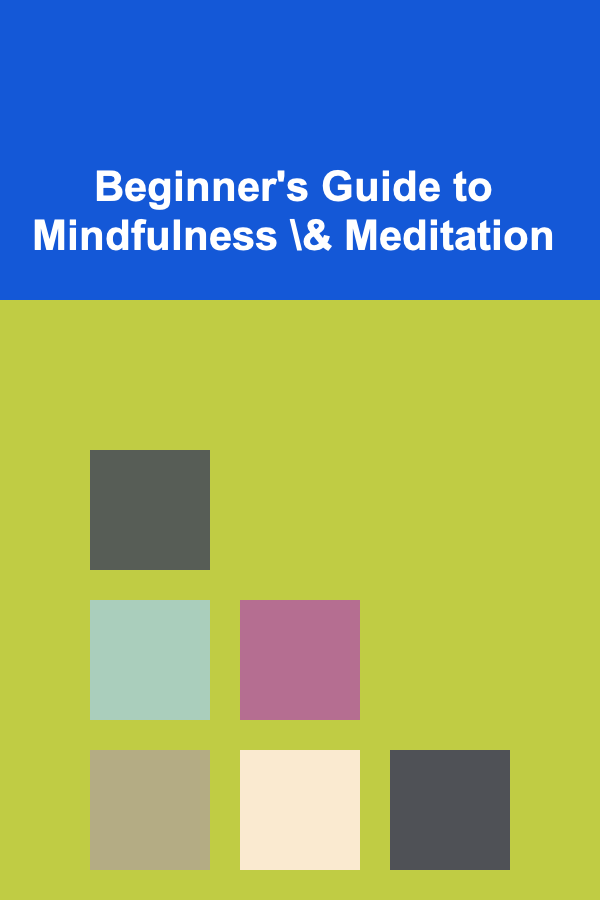
Beginner's Guide to Mindfulness & Meditation
ebook include PDF & Audio bundle (Micro Guide)
$12.99$10.99
Limited Time Offer! Order within the next:

Mindfulness and meditation have gained widespread popularity in recent years due to their many mental, physical, and emotional benefits. While these practices have roots in ancient traditions, particularly within Buddhism, they have become widely embraced across cultures and lifestyles. In this guide, we'll explore mindfulness and meditation, providing practical advice, techniques, and insights for beginners. Whether you're looking to reduce stress, improve focus, or simply enhance your overall well-being, this guide will serve as an actionable step-by-step path to starting your mindfulness and meditation journey.
What is Mindfulness?
Mindfulness is the practice of paying attention to the present moment in a non-judgmental way. It involves being aware of your thoughts, feelings, bodily sensations, and the surrounding environment, without becoming overly reactive or overwhelmed by them. Essentially, mindfulness is about bringing your full attention to the here and now, rather than being distracted by past events or future worries.
Key Aspects of Mindfulness:
- Awareness: Mindfulness begins with awareness, which is the ability to notice what's happening in the present moment. This can be your breath, sensations in your body, sounds around you, or even your current thoughts.
- Non-Judgmental Attitude: Practicing mindfulness means observing without labeling your experiences as "good" or "bad." It's about accepting things as they are, rather than trying to change or avoid them.
- Focus on the Present: Mindfulness teaches you to direct your focus toward the present rather than worrying about the future or ruminating on the past. This simple shift in focus can have profound effects on your mental clarity and emotional balance.
What is Meditation?
Meditation is a mental practice that often involves focusing your mind, calming your thoughts, and achieving a state of deep concentration or relaxation. Meditation and mindfulness overlap in many ways, but meditation typically involves a more structured approach to cultivating focus and calmness.
While mindfulness is a way of living with awareness throughout the day, meditation is often a formal practice that is done at specific times---such as sitting quietly for a set period. It provides a space where you can cultivate mindfulness and other positive mental states, such as compassion, love, and clarity.
Types of Meditation:
- Mindfulness Meditation: This is the most direct overlap between mindfulness and meditation. In mindfulness meditation, you observe your thoughts and sensations without attachment, often by focusing on your breath or a body scan.
- Loving-Kindness Meditation (Metta): This type of meditation focuses on cultivating feelings of compassion and love for yourself and others. The goal is to develop kindness towards all beings, even those with whom you might have conflict.
- Body Scan Meditation: In this practice, you systematically focus on each part of your body, noticing sensations and releasing tension. This can help increase bodily awareness and promote relaxation.
- Transcendental Meditation (TM): This form of meditation involves the repetition of a mantra to transcend normal thought patterns and enter a state of restful alertness.
- Zen Meditation (Zazen): A traditional Buddhist practice that focuses on seated meditation, often with a focus on posture and breath. The goal is to cultivate awareness and insight through stillness.
Why Practice Mindfulness and Meditation?
The benefits of mindfulness and meditation extend to various aspects of life, offering profound mental, emotional, and physical improvements. Here are some reasons why you should consider incorporating mindfulness and meditation into your daily routine:
Mental and Emotional Benefits:
- Stress Reduction: Mindfulness has been shown to reduce stress by helping individuals detach from the constant flow of thoughts that often lead to anxiety. By focusing on the present moment, you can break the cycle of rumination and stress.
- Improved Focus and Concentration: Regular meditation helps strengthen the brain's ability to focus by training it to concentrate on one thing at a time. This can lead to better productivity and improved attention span.
- Enhanced Emotional Regulation: Mindfulness practices help you recognize your emotions as they arise, giving you the opportunity to respond rather than react impulsively. This can lead to better emotional stability.
- Reduction of Anxiety and Depression: Studies have shown that mindfulness meditation can reduce symptoms of anxiety and depression, likely by helping individuals to break negative thought cycles and promoting a more balanced mental state.
- Increased Self-Awareness: Meditation encourages self-reflection, allowing you to observe your thoughts and behaviors without judgment. This heightened awareness can lead to personal growth and improved decision-making.
Physical Benefits:
- Lower Blood Pressure: Meditation has been shown to lower blood pressure and reduce heart rate, which can contribute to improved cardiovascular health.
- Better Sleep: Mindfulness can improve the quality of your sleep by helping you relax and unwind before bed, reducing the impact of stress on your sleep cycle.
- Pain Management: Mindfulness practices, especially body scan meditation, have been used to reduce chronic pain by helping individuals focus on the present moment and shift attention away from pain sensations.
- Boosted Immune System: Research suggests that mindfulness and meditation can enhance immune function, helping your body better fight off illness.
How to Get Started with Mindfulness and Meditation
1. Create a Comfortable Space:
Find a quiet and comfortable spot to practice. This can be a cozy corner in your home, a garden, or any place where you feel at ease. The environment should promote relaxation and minimize distractions.
2. Set Realistic Expectations:
It's important to start with realistic goals. Begin with just 5--10 minutes of mindfulness or meditation daily. Don't expect to achieve instant results---mindfulness and meditation require practice over time.
3. Start with Focused Breathing:
A simple way to begin is by focusing on your breath. Sit or lie down in a comfortable position, close your eyes, and breathe deeply. Pay attention to the sensation of the breath entering and leaving your body. If your mind wanders, gently guide your focus back to your breath without judgment.
4. Practice Mindful Observation:
Mindfulness can be practiced throughout the day by bringing your full attention to whatever task you're doing. Whether you're eating, walking, or washing dishes, try to immerse yourself fully in the present moment. Notice the sensations, smells, sounds, and textures around you without labeling them as good or bad.
5. Use Guided Meditation Apps:
For beginners, guided meditation apps can be very helpful. Apps like Headspace, Calm, or Insight Timer provide step-by-step instructions and meditations led by experienced practitioners. These can help ease you into the practice and offer structure if you're unsure where to begin.
6. Practice Loving-Kindness Meditation:
Loving-kindness meditation can be a powerful way to cultivate compassion. Start by sitting in a comfortable position and silently repeating phrases like, "May I be happy, may I be healthy, may I be safe, may I live with ease." Once you've sent love to yourself, gradually extend the wishes to others: loved ones, acquaintances, and even those you may have conflicts with.
7. Be Kind to Yourself:
Mindfulness and meditation are not about achieving perfection. There will be times when your mind wanders, and you might feel frustrated. This is completely normal. Instead of being self-critical, gently return your attention to the present moment with kindness and patience.
8. Keep a Journal:
After your practice, take a few minutes to reflect on your experience. You can keep a mindfulness journal to track your thoughts, emotions, and progress. This can help deepen your practice and provide insight into your personal growth.
Tips for Maintaining Consistency
Starting is often the hardest part, but maintaining consistency is key to experiencing the benefits of mindfulness and meditation. Here are some tips for making your practice a regular part of your life:
- Schedule Daily Practice: Set a specific time each day to practice. Whether it's first thing in the morning or just before bed, consistency helps make it a habit.
- Start Small: Don't overwhelm yourself with long sessions. Start with just a few minutes each day, and gradually increase your practice as it feels comfortable.
- Use Reminders: Set daily reminders on your phone or place sticky notes around your house to remind you to practice mindfulness throughout the day.
- Join a Community: Find a meditation or mindfulness group, either in-person or online, to share experiences and gain support.
Conclusion: Embarking on Your Mindfulness and Meditation Journey
Mindfulness and meditation are transformative practices that can lead to greater peace of mind, improved mental and emotional health, and enhanced physical well-being. Starting out as a beginner may seem daunting at first, but remember that each small step contributes to a larger journey of self-awareness and growth. Be patient with yourself, celebrate your progress, and allow your practice to evolve naturally over time. By integrating mindfulness into your daily life, you can develop a deeper connection to yourself and the world around you.

How to Create a Checklist for Engaging Followers with Polls, Quizzes, and Surveys
Read More
How To Get Better at Deduction Games
Read More
How to Make Your Home Party Special with Unique Party Favors
Read More
How to Monetize Your Deep Learning Skills for Ongoing Income
Read More
How to Organize Your Home to Save Space and Reduce Clutter
Read More
Why You Should Keep an Ongoing Donation Box
Read MoreOther Products

How to Create a Checklist for Engaging Followers with Polls, Quizzes, and Surveys
Read More
How To Get Better at Deduction Games
Read More
How to Make Your Home Party Special with Unique Party Favors
Read More
How to Monetize Your Deep Learning Skills for Ongoing Income
Read More
How to Organize Your Home to Save Space and Reduce Clutter
Read More